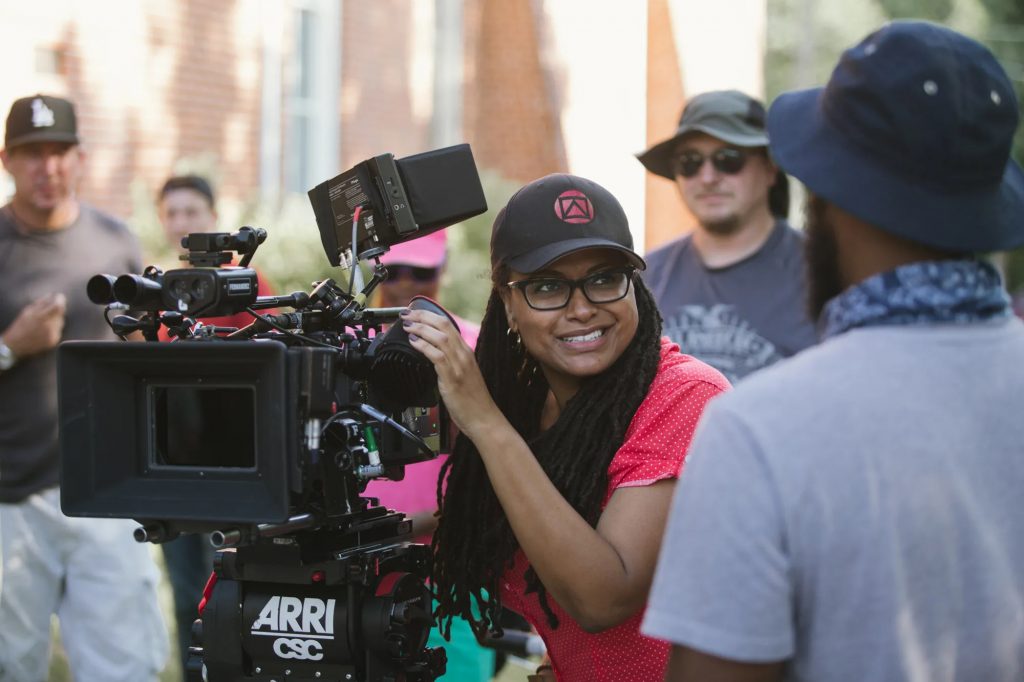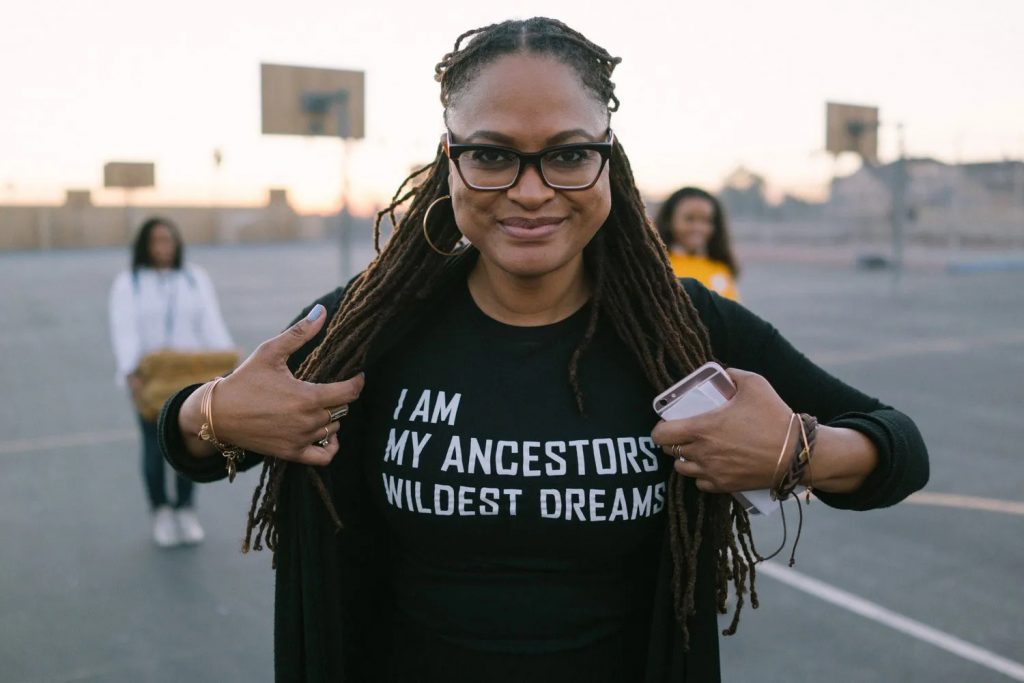When Ava DuVernay received a Golden Globe nomination for Best Director, she made a place in the annals of film history as the first African-American woman to be selected for the honor. It was for her film Selma (2014), a biopic about Martin Luther King Jr. Three years later, she won the BAFTA for Best Documentary for 13th, a searing take on America’s military-industrial complex; the film was also a Best Documentary Feature nominee at the Oscars.
A woman of color winning accolades is momentous. Racism in Hollywood and in the world makes implicit assurances for some and less so for others, often people of color. DuVernay is doubly jinxed in an industry where gender inequality is rampant. Her rise is inspirational, but inspiration alone won’t bring about changes in an industry where ills tend to operate insidiously.
It’s what makes DuVernay’s rise important—not only has she highlighted inequalities through her work, but she has also played a role in tackling them through concrete action. This article is about the significance of her work in challenging the status quo.
Ava DuVernay’s early life and career
Born in 1972 in Long Beach, California, Ava DuVernay was raised by her mother and stepfather. During her summer vacations, she would travel to her stepfather’s childhood home near Selma, Alabama. These summers were influential in the making of Selma as her father had witnessed the Selma to Montgomery marches against the disenfranchisement of African Americans.
DuVernay started in journalism, interning with CBS News and helping cover the O.J. Simpson murder trial. Disillusioned with journalism, she moved on to public relations and started her own public relations firm, through which she provided PR services to the entertainment and lifestyle industries. She launched Urban Beauty Collective, a network connecting over 10,000 African-American beauty salons and barbershops in 16 U.S. Cities.
DuVernay made her first film, Saturday Night Life, in 2005 with $6,000 based on her mother’s experiences raising her kids alone. The film was part of Showtime’s Black Filmmaker Showcase. She ventured to documentaries in 2007. A year later, she made her feature directorial debut with the alternative hip-hop documentary This Is the Life, based on California’s Good Life Cafe, known for its open mic nights that gave impetus to the alternative hip-hop movement. The movie was well-received by audiences and won multiple awards.
She would then direct three TV documentaries centered on African-American entertainment, a history of female hip-hop artists, and a story about two Black sisters reclaiming their lives after Hurricane Katrina’s devastation.
Acclaim for debut narrative feature film and high praise from Roger Ebert
Ava DuVernay’s first narrative feature film, I Will Follow, is based on her experiences caring for her aunt during the last year and a half of her life. The great film critic Roger Ebert hailed it as one of the best films he had seen about coming to terms with the death of a loved one. The film was an official selection of AFI Fest, Urbanworld, the Pan-American Film Festival, and the Chicago International Film Festival.
2012 was an equally stellar year for DuVernay. Her film Middle of Nowhere, about the wife of an incarcerated man serving a 10-year prison sentence, drove home the reality of how women of color commonly bear the burden of incarceration. The movie drew inspiration from DuVernay’s interactions with women who were victims of incarceration. That year, the film won the U.S. Directing Award in the Dramatics category at the Sundance Film Festival.
At the opening of the Smithsonian National Museum of African American History and Cultures in 2016, the museum debuted DuVernay’s film chronicling six historical events that happened on August 28, the same date, in different years.
The DuVernay Test
The DuVernay Test was coined by New York Times film critic Manohla Dargis about her piece praising the 2016 Sundance Film Festival for its selections pushing mainstream choice. Regarding including African Americans and other minorities in film, she suggested the DuVernay Test in honor of DuVernay’s efforts to challenge the lack of diversity in Hollywood.
It was the same year that the Oscars faced backlash for minimal racial representation in its nominee selections and were mocked through the hashtag #OscarsSoWhite. The test named after DuVernay came from the Bechdel Test, a measure of the representation of women in film and other fiction.
Catapult to worldwide fame with Selma and 13th

Selma, DuVernay’s 2014 movie about Dr. Martin Luther King Jr. and the 1965 Selma to Mongomery march, won rave reviews from critics. The film was commended for its unapologetic depiction of the Civil Rights Movement. It depicted bombings, beatings, and shootings, taking viewers into the gruesome world of the Jim Crow South.
Selma received nominations in the Best Picture and Best Original Song categories, winning the latter for the song “Glory.” In 2016, the New York Film Festival opened with DuVernay’s documentary 13th, after the Thirteenth Amendment to the U.S. Constitution outlawing slavery. Featuring several prominent activities, politicians, and public figures, the documentary was hailed by critics and has a 97% rating on Rotten Tomatoes.
In 2015, she created and executive produced the drama series Queen Sugar, based on Natalie Baszile’s novel. The series follows the journey of three siblings who inherit their father’s 800-acre sugarcane farm in Louisiana and face problems related to family, race, and culture. Queen Sugar premiered on the Oprah Winfrey Network to critical acclaim.
Bringing below-the-line crew members together through an organized database
In 2011, Ava DuVernay launched her production company, African-American Film Festival Releasing Movement (AFFRM), which was later rebranded to Array. The company’s mission is to “produce, distribute, and amplify the work of Black artists, filmmakers of color, and women of all kinds.”

It has created Array Crew, a personnel database highlighting women, people of color, and other underrepresented, below-the-line crew members in Hollywood. DuVernay has described the database as “IMDB meets LinkedIn,” allowing people to create profiles and enhance their online visibility. The company’s relations team also assists people in putting their profiles together.
ARRAY 101, the company’s online educational initiative, has produced supplemental learning materials for students in grades nine and above, serving as a resource for those seeking to further their social justice and advocacy knowledge. During the COVID-19 pandemic, ARRAY launched a $250,000 fund to provide grants to creators and organizations telling stories of underrepresented communities, particularly those impacted by the global coronavirus pandemic.
A stint with podcasts
In 2013, DuVernay jumped on the podcast bandwagon with The Call-In series featuring conversations with black filmmakers. Her goal was to create a space where the filmmakers could talk about their craft, thereby engaging in an experience different from the usual interviews where they’re asked about their race or gender.
In 2021, she signed a multi-year deal to produce exclusive podcasts with Spotify. The following year, she created the American superhero drama television series Naomi, based on the comic book series of the same name. It briefly ran on CW from January 11, 2022, to May 10, 2022.
Taking on the caste system in Origin
DuVernay’s 2023 film Origin, an adaptation of Isabel Wilkinson’s 2020 bestseller Caste: The Origins of Our Discontent, posits that racism and casteism all result from the same system of global oppression. Described as a stylistically bold adaptation of the Pulitzer Prize-winning author’s book, Origin links America’s anti-Black racism to the eugenics theories that led to Nazism and the caste system in India.
DuVernay spent a year and a half writing Origin, taking audiences on a Black woman’s intellectual journey, and broke away from a linear structure to, in DuVernay’s own words, a journey through “cultures, continents, and time frames.” Ditching studio backing, she went indie, raising $38 million from the Ford Foundation and non-profits funded by Melinda French Gates, Laurene Powell Jobs, and Anne Wojcicki. DuVernay has expressed that big money can compel filmmakers to change their vision while making their movies, a temptation she wanted to avoid. Origindebuted at the Venice Film Festival, where DuVernay became the first African-American woman in the festival’s 80-year history to compete for the Golden Lion.
Ava DuVernay Barbie doll
Several iconic actresses and singers have been made into Barbie Dolls, including Audrey Hepburn, Diana Ross, Ella Fitzgerald, and Tina Turner. In 2015, Mattel created the Ava DuVernay Barbie doll as one of six dolls based on inspirational women in the entertainment industry. The doll, which came with a director’s chair with DuVernay’s name, sold out on the Mattel website less than an hour after it first went on sale. All proceeds were donated to Witness and Color of Change charities.
A filmmaker for the ages
The contribution of cinema to social consciousness is decades old. Stories, when told impactfully, can influence social justice outcomes and push people out of their comfort zones to become participants in change. Ava DuVernay, with her mighty talent and courage, is only getting started on what will surely become an iconic journey for the ages.